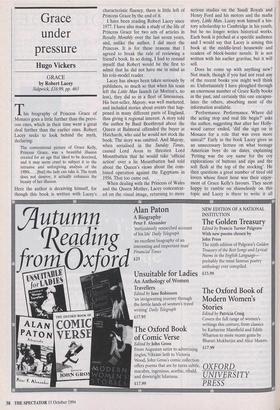Grace under pressure
Hugo Vickers
GRACE by Robert Lacey
Sidgwick, £16.99, pp. 463
This biography of Princess Grace of Monaco goes a little further than the previ- ous ones, which in their time went a great deal further than the earlier ones. Robert Lacey seeks to look behind the myth, declaring:
The conventional picture of Grace Kelly, Princess Grace, was a beautiful illusion created for an age that liked to be deceived, and it may seem cruel to subject it to the intrusive and unforgiving analysis of the 1990s . . . [but] the lady can take it. The truth does not destroy, it actually enhances the beauty of her illusion.
Here the author is deceiving himself, for though this book is written with Lacey's characteristic fluency, there is little left of Princess Grace by the end of it.
I have been reading Robert Lacey since 1977. I have also made a study of the life of Princess Grace for two sets of articles in Royalty Monthly over the last seven years, and, unlike the author, I did meet the Princess. It is for these reasons that I agreed to break the rule of reviewing a friend's book. In so doing, I had to remind myself that Robert would be the first to admit that he did not have me in mind as his role-model reader.
Lacey has always been taken seriously by publishers, so much so that when his team left the Little Man launch (at Morton's, no less), they did so in a fleet of limousines. His best-seller, Majesty, was well marketed, and included stories about events that hap- pened in many different parts of England, thus giving it regional interest. A story told the author by Basil Boothroyd about the Queen at Balmoral offended the buyer at Hatchards, who said he would not stock the book. The story was omitted. And Majesty, when serialised in the Sunday Times, caused Lord Avon to threaten Lord Mountbatten that he would take 'official action' over a lie Mountbatten had told about the Queen's views about the com- bined operation against the Egyptians in 1956. That too came out.
When dealing with the Princess of Wales and the Queen Mother, Lacey concentrat- ed on the visual image, returning to more serious studies on the Saudi Royals and Henry Ford and his motors and the mafia story, Little Man. Lacey won himself a his- tory scholarship to Cambridge in his youth, but he no longer writes historical works. Each book is pitched at a specific audience and I would say that Lacey is aiming this book at the middle-level housewife and readers of block-buster novels. It is not written with his earlier gravitas, but it will sell.
Does he come up with anything new? Not much, though if you had not read any of the recent books you might well think so. Unfortunately I have ploughed through an enormous number of Grace Kelly books in the past, and certainly this one encapsu- lates the others, absorbing most of the information available.
`Performance. Performance. Where did the acting stop and real life begin?' asks the author, suggesting that after her Holly- wood career ended, 'did she sign on in Monaco for a role that was even more unreal?' Early in the book Lacey gives us an unnecessary lecture on what teenage American boys do on dates, explaining `Petting was the coy name for the coy explorations of buttons and zips and the soft flesh at the top of the stocking'. He then questions a great number of tired old lovers whose finest hour was their enjoy- ment of Grace Kelly's favours. They seem happy to ramble on shamelessly on this topic and Lacey is there to write it all down. Don Richardson felt the need to inform the author that when Kelly was cooking and cleaning she had 'her but- tocks only barely covered. She was marvel- lously endowed in that department'. So freely did these old boys meander on that Lacey almost chastises Herbie Miller for his reticence: 'Let us just say we were sweethearts.'
This line of questioning did create one vignette about the research that made me laugh out loud. Donald Sinden wrote in his book, A Touch of the Memoirs, that during the filming of Mogambo, he stum- bled into Clark Gable's darkened room one night, whereupon the actor and a girl sat up in bed stark naked. 'So was the young lady Grace Kelly?' asked the ever prurient author. Sinden paused. 'I've often wondered that myself,' he said.
Rising above the many beds in this book, we learn that Grace's father was a bully who was jealous of her, that she was coldly ambitious, that she was not a very good actress but always a delight to look at on the screen. When she married Prince Rainier she expected to find herself over- seeing an important principality. This it was not, but she put it on the map. The author does not feel that she was well treated by her husband, who emerges as rather boorish. Finally she more or less left for Paris, where, apparently, she forged some friendships with younger men. All this we already knew. Whatever her faults, Princess Grace had great dignity. When I met her a year before she died, I remember thinking her wise and rather proper, the kind of person who would disapprove of a remark in ques- tionable taste. She did not seem to be having a happy or interesting life. When I sent her something later, she replied in her own hand. She would have hated this book, even if written about another.



























































 Previous page
Previous page